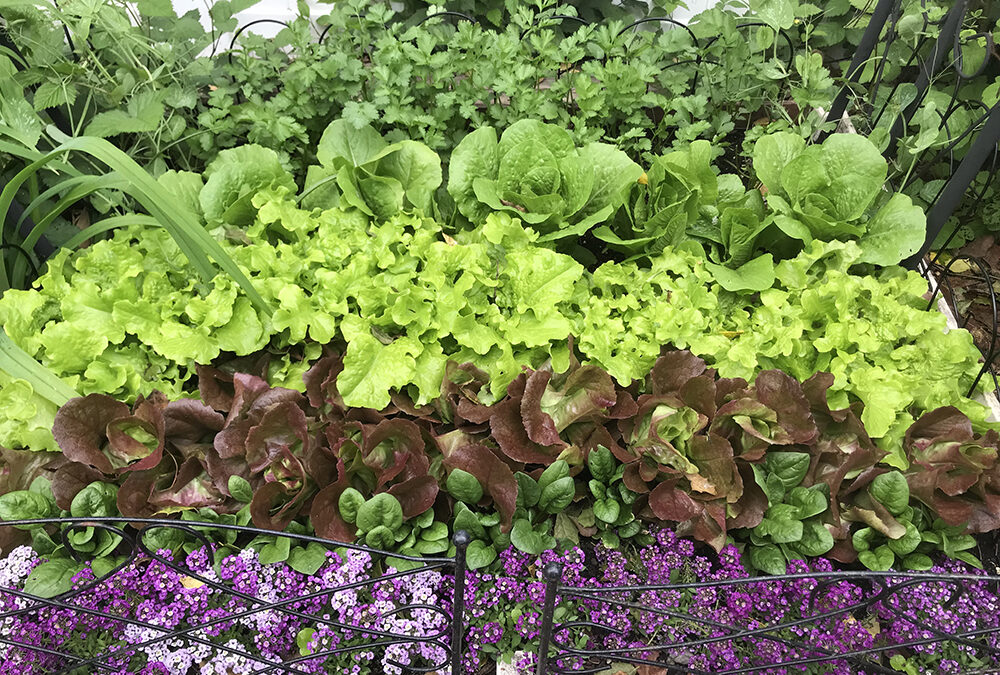Let It Grow
By Tammy Thornton
Spring-blooming flowers and warmer weather may have you thinking you would like to try your hand at gardening. But where does one begin? My first word of advice to a beginner gardener would be: Keep it simple. You may have visions of a lush English garden tumbling over with roses or vegetable gardens overflowing with produce, allowing you to “live off of the land.” While these dreams and aspirations provide great motivation, a tendency to buy out the garden nursery by purchasing every imaginable flower and vegetable could be a recipe for failure as you become overwhelmed. Start slowly, and do it well, and you will be on your way to a lifelong joy of gardening.
Small successes will give you the courage and enthusiasm to expand your knowledge and growing space. Fortunately, gardens are always teaching us new things. While no two gardens are alike, even the same garden can change season-to-season, year-to-year, and plant-to-plant.
Each experience — whether good or bad — is a time of learning; don’t let a nibbled hosta or a wilted hydrangea discourage you. Research what went wrong and learn how to give your plant its best life.
When starting your own garden, you have many things to consider, such as whether your garden receives full sun or has a shady disposition. Keep in mind that most yards will have a combination of both. That is why it is a good idea to choose one spot and focus on growing something wonderful in that location before attempting to plant out your entire property. Choose easy-to-grow plants before moving on to diva plants that will drive you crazy. Another decision to make is whether you want to grow annuals or perennials. Annuals complete their entire life cycle in one growing season or year. They will give you a boost of confidence, because, in the correct environment, they will bloom their little hearts out until their life cycle is complete, but then they will leave you with only memories (or perhaps a few seeds for posterity). Perennials, treated properly, will come back year after year and save you money. Over time, most perennials will grow to the point of needing to be divided, giving you even more plants. Just keep in mind that some perennials will bloom only for a short time, such as only a couple of weeks in spring or summer, so you may want to add in a few annuals if you need to see constant blooms. Both annuals and perennials have their own season to bloom. A thriving spring garden will begin to fade once the heat of summer comes along. A well-planned garden will take into account each season.
While it is very gratifying to grow plants from seeds, this can be a very frustrating endeavor for the newbie gardener. I would recommend starting with seedlings from your garden nursery until you have built up your knowledge and confidence. That way someone else has done the difficult part of germinating the seeds and helping you through the first difficult steps. Once the weather is warm, buy tomatoes, cucumbers, and zucchini plants that have already been started for you. If you feel like it’s cheating and want to grow something from beginning to end, try some of the easiest plants to grow from seed, such as cilantro, lettuce, zinnias, and marigolds. Keep in mind that cilantro and lettuces enjoy cooler weather and will bolt and fade once it becomes too warm. Likewise, zinnias and marigolds have their own season and prefer warm weather to germinate and grow. Growing a salad bowl from seed can be a rewarding project for a beginner gardener. Simply grab a packet of mesclun mix seeds. This will be a mix of salad green seeds that will grow together and can be harvested at the same time. They are fast growers, so you can go from seed to salad in about 30 days. This is a great beginner gardening project to do with children.
Starting with an herb garden can also be an easy and delicious way of jumping on the gardening bandwagon. Not much can match a summer tomato topped with fresh basil from your garden. Imagine adding freshly snipped rosemary to your lemon chicken, and the aroma will ensure that no one is late for dinner. Or top your take-out pizza with oregano from the garden, and it will taste a little closer to homemade. Educate yourself each step of the way, since even a simple herb garden takes a little know-how. Basil doesn’t like to be cold, rosemary wants dry, well-drained soil, and oregano should stay in its own pot, or it will take over the world — or at least a big part of your garden.
A small, thriving garden will bring you more peace than a large, uncontrollable hodgepodge of plants. Beautify one section of your garden before moving on to the next. Seek advice from a community of gardeners, but don’t let their knowledge intimidate you. We all started at the beginning. Share your successes (and failures) with our readers. Send your gardening stories, comments, and questions to shorelocalgardener@gmail.com.
Tammy Thornton lives with her husband, children, and crazy pets while enjoying a life of gardening, cooking, and going to the beach.

















